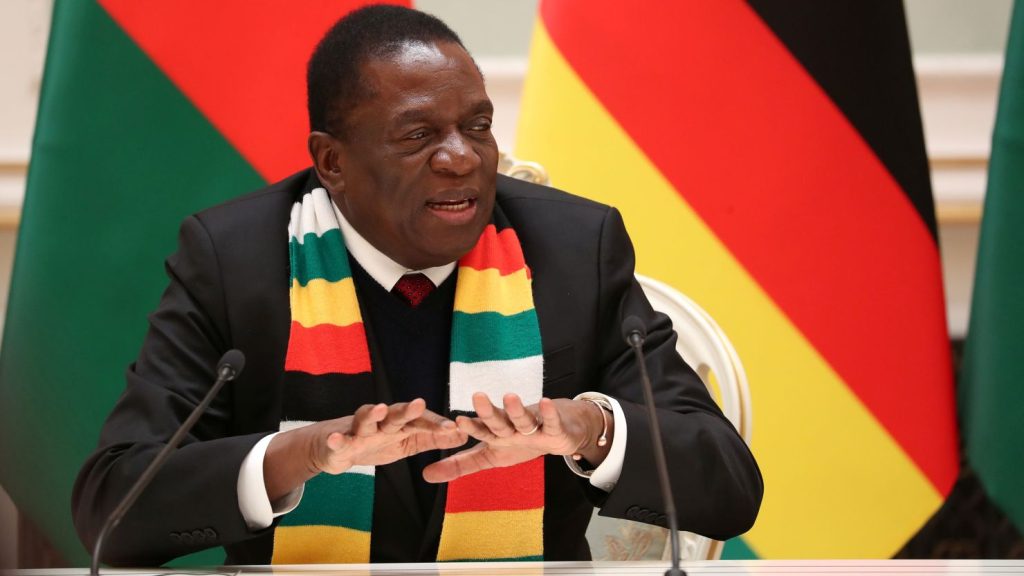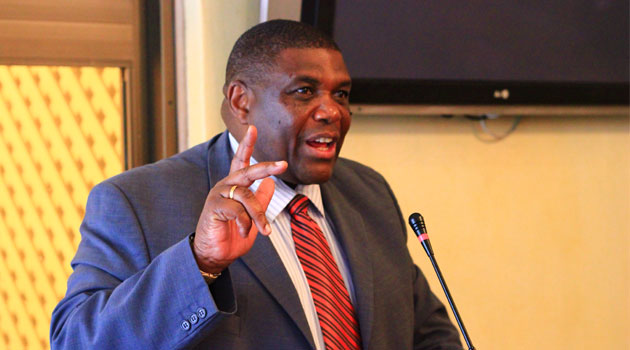By Dr David Matsanga in London
This is my open statement as to why Zimbabwe sanctions facilitated by USA ZDERA Act of 2001 must be challenged in ICJ. We have therefore, with the help of two state parties moved to court to challenge the USA and European Union Sanctions.
Statement
There have been several discussions and reports about changes in the sanctions landscape, including the potential repeal of certain executive orders. However, the specifics about ZDERA and how it operates remain crucial:
I want the world and the people of Zimbabwe to know that East or West the Status of ZDERA will always fluctuate between removal and Additional mechanisms of sanctions .While some executive orders may have been repealed, ZDERA itself continues to exist as a legislative framework, allowing the U.S. government to impose sanctions without needing to go through Congress every time.
The flexibility of sanctions that the USA operates is dangerous for Zimbabwe . Even if some executive orders are repealed, ZDERA retains the authority for sanctions to be applied at any time. This means that the underlying ability to enact sanctions remains, allowing for rapid action based on the current situation in Zimbabwe. This again is dangerous for Zimbabwe.
The most obnoxious thing about ZDERA Act 2001 is the Legislative verses Executive Actions USA that keep on exchanging roles while Zimbabweans are dying that the distinction between executive orders and congressional acts is important. Even if certain executive sanctions are lifted, ZDERA can still enable the president to impose new sanctions if deemed necessary.
The imposition of sanctions on Zimbabwe has had profound repercussions, deeply affecting the socio-economic fabric of the nation. Economic restrictions, initially intended to penalize governmental actions, have inadvertently inflicted widespread hardship on the civilian population, exacerbating poverty levels and limiting access to essential services such as healthcare and education.
The sanctions, which have targeted key sectors such as finance and trade, create a paradox where the intended political outcomes often adversely impact the very demographics they aim to support. Furthermore, the erosion of public trust in state institutions and international actors contributes to an environment of instability, fueling discontent among the masses.
As the situation continues to deteriorate and as new goal posts are placed on Zimbabwe there is an urgent need for intervention, with institutions like the International Court of Justice (ICJ) playing a pivotal role in mediating grievances and advocating for human rights, thereby facilitating a pathway toward resolution and restoration of normalcy in Zimbabwe.
Overview
My overview of Zimbabwe’s political and economic landscape and the imposition of sanctions leads to one solution left – the ICJ. Zimbabwe’s political and economic landscape has been marred by decades of instability, characterized by a decline in democratic governance and rampant corruption.
Since the early 2000s, the nation has experienced hyperinflation, leading to severe economic hardships for the majority of its citizens. This decline has been exacerbated by the imposition of international sanctions, which were originally designed to pressure the ruling government to restore what USA alleged human rights abuses and democratic processes.
However, these sanctions have disproportionately affected the ordinary Zimbabwean, leading to increased poverty and a deteriorating standard of living. The impact is reminiscent of other regions facing conflicts, where external interventions often fail to consider the social and economic realities of the affected populations, leading to unintended consequences
I have been at the forefront since 1998 telling Zimbabwe to the question of sanctions. But addressing these issues requires a comprehensive strategy that not only reevaluates the effectiveness of sanctions but also promotes dialogue and meaningful engagement through organizations like the International Court of Justice (ICJ), which can advocate for removal of sanctions and return of social justice in Zimbabwe.
The Impact of sanctions on the Zimbabwean Population is huge. Millions have been affected in 26 years of American sanctions. The imposition of sanctions on Zimbabwe has had profound repercussions on its populace, exacerbating already dire socio-economic conditions. These sanctions, initially intended to penalize government officials for human rights abuses, have inadvertently led to widespread suffering among ordinary citizens.
The truth is that with restricted access to international markets and financial institutions, the economy has stagnated, resulting in soaring unemployment and inflation rates, which has rendered basic necessities unaffordable for many. Furthermore, the internal political instability created by some groups and accelerated by these sanctions has impeded efforts to foster stability , as noted in research on similar concerns in Africa .
I have studied all documents of the African Commission on Human and Peoples’ Rights highlighted, when national legal frameworks are weakened, the capacity to protect human rights diminishes, which is exemplified in Zimbabwe’s deteriorating environment for civil liberties ((Commission A on Human and Peoples’ Rights)
Thus, it is crucial for international bodies like the International Court of Justice (ICJ) to intervene, aiming to provide avenues for relief and facilitate a pathway towards national reconciliation.
The economic consequences caused by inflation, unemployment, have caused inadequate access to basic services. In Zimbabwe, the harsh economic consequences stemming from international sanctions have manifested profoundly in inflation, unemployment, and diminished access to basic services.
The hyperinflation experienced in the country has not only eroded savings but also significantly impacted the purchasing power of citizens, making essential goods and services increasingly unaffordable. Coupled with skyrocketing inflation rates, the sanctions have exacerbated unemployment, as businesses struggle to operate amid limited resources and investment.

This labor market instability has left countless families without a reliable income, further complicating their ability to secure basic necessities. As noted in existing literature, these economic disruptions can lead to adverse effects on health and health systems, ultimately affecting the most vulnerable populations.
I believe that by additionally, addressing systemic USA sanctions that shall have added value to educational and healthcare systems in Zimbabwe that remain a foundational step toward sustainable economic recovery
I believe that the Role of the International Court of Justice (ICJ in addressing the multifaceted crisis in Zimbabwe, the International Court of Justice (ICJ) would play a pivotal role in upholding international law and mediating disputes that arise from state-sanctioned actions.
The USA sanctions often exacerbate humanitarian crises, the ICJ has the authority to adjudicate on matters of state responsibility, potentially providing a platform for Zimbabwean citizens to seek redress against unlawful economic measures. The USA must explain as to why the put sanctions and to why they did think of the suffering of the women and children in Zimbabwe.
Given that countries under sanction frequently face accusations of human rights violations, the ICJ can intervene by offering legal frameworks that promote accountability and transparency. For instance, its rulings could help clarify the obligations of states concerning the welfare of their populations, thus ensuring that punitive measures do not unduly harm the civilian populace.
To me such a legal approach emphasizes fairness, which is essential in resolving political disputes and broader societal grievances as highlighted in discussions around procedural justice. Ultimately, the ICJs involvement could foster dialogue and contribute to stability in a region affected by widespread trauma and conflict
The is enough evidence that the matter of ZDERA Act 2001 can be resolved mechanisms which the ICJ has used elsewhere to mediate and resolve international political disputes. In addressing international disputes, the International Court of Justice (ICJ) employs several mechanisms that facilitate mediation and resolution. Central to its function is the opportunity for states to submit cases involving issues of international law, allowing the ICJ to render binding decisions that can promote compliance.
The Court also encourages diplomatic dialogue and negotiations between disputing parties, often facilitating preliminary discussions to foster a collaborative atmosphere. Furthermore, the ICJs advisory opinions offer legal clarity on contentious issues, which can guide states in their bilateral or multilateral relations.
These mechanisms are particularly relevant to situations like the crisis in Zimbabwe, where international disputes may arise from sanctions and humanitarian challenges. Ultimately, through its adjudicative and advisory roles, the ICJ possesses the potential to influence policy changes that address the underlying causes of conflicts and foster peaceful resolutions.
In my Conclusion I have contemplated the ramifications of sanctions imposed on Zimbabwe, it has become evident that their detrimental effects extend far beyond the political elite, deeply impacting the everyday lives of ordinary citizens.
The economic collapse that ensued after sanctions has led to widespread poverty, rampant inflation, and diminished access to essential services, ultimately exacerbating the humanitarian crisis that could plague the nation of Zimbabwe. Moreover, the sanctions have inadvertently created wrong narrative, portraying Zimbabwe as a country you can’t invest in.
The adversaries stifle dissent domestically have used sanctions to create bad image for Zimbabwe. Such dynamics create a cycle of suffering and repression that proves difficult to break. Addressing these complexities requires a multifaceted approach, where international law mechanisms, such as the jurisdiction of the International Court of Justice (ICJ), can play a pivotal role.
I believe that by establishing legal avenues for addressing grievances and promoting dialogue, the petition at ICJ presents an opportunity to facilitate both accountability and the eventual a healing process of a fractured society ( UN Publications)
Ultimately, re-evaluating the sanctions and engaging in constructive international dialogue may pave the way for sustainable solutions, ensuring that the voices of Zimbabwe’s masses are not only heard but also prioritized in the quest for justice and recovery.
The implementation of such holistic strategies could significantly contribute to the restoration of Zimbabwe’s dignity, allowing Zimbabweans to reclaim their future without the overshadowing specter of punitive measures that have historically perpetuated their suffering.
I give my position that the effects of sanctions and the potential for ICJ intervention to alleviate the crisis in Zimbabwe are real . The imposition of sanctions against Zimbabwe has had far-reaching effects, exacerbating existing economic challenges and intensifying social dislocation. Instead being effective as claimed by USA, these measures often disenfranchise ordinary citizens, limiting their access to essential goods and services.
Over the years, inflation has surged, unemployment rates have soared, and public health systems have deteriorated, leaving the masses to bear the brunt of geopolitical conflicts especially the suffering of Zimbabweans in South Africa. The potential for intervention by the International Court of Justice (ICJ) offers a glimmer of hope in addressing these multifaceted crises.
I am of the opinion that by calling for dialogue and legal accountability both internally and externally , the ICJ could advocate for a more balanced approach that considers the human rights implications of sanctions and make determination with USA trying to just impose sanctions without good reasons.
Finally I would like to say that this is my last attempt voluntary Act as volunteer for Zimbabwe and person who has defended Zimbabwe since 1998 . Therefore these are the options that can help to remove all obnoxious ZDERA ACT 2001 OUT Zimbabwe.
It is up to some of the people from
Zimbabwe that were targeted by the USA to take this opportunity to enjoin me in this petition and clear their names by using this chance at the ICJ so that we uproot the main obstacle that is has been used on Zimbabwe year in year out .
Our intervention could facilitate a pathway toward sustainable governance, providing a framework through which Zimbabwe can recuperate economically and socially while removing the obstacles stood in between because of imposed sanctions .
Thanking all of you in advance
I remain
Yours truly
Dr. David Matsanga
Founder /Chairman
Pan African Forum Ltd
Surely United Kingdom
London 30.10. 2024







